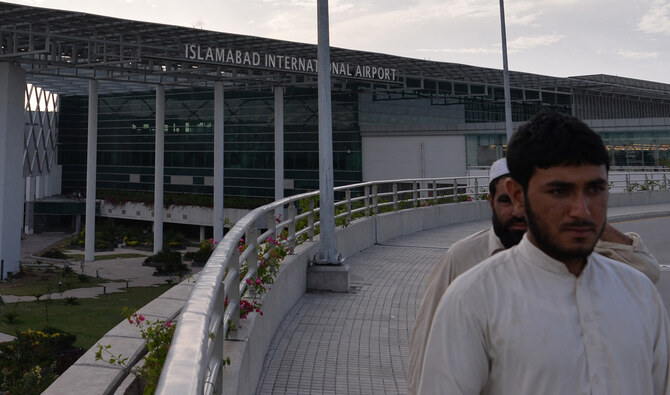ISLAMABAD: Pakistan’s ruling coalition on Monday announced it would boycott Supreme Court proceedings in the case of the election of the Punjab chief minister shortly after the court rejected a government plea to form a full court bench to hear all petitions regarding last week’s election of the provincial chief executive.
The judgment came after an hours-long hearing of the petition relating to the contentious re-election of Hamza Shahbaz on July 22, when Punjab Assembly Deputy Speaker Dost Muhammad Mazari invalidated 10 votes cast against Shahbaz by members of the opposition Pakistan Muslim League-Quaid (PML-Q), some of whom are now siding with ex-PM Imran Khan's Tehreek-e-Insaf (PTI) party.
Mazari had based his July 22 ruling on a recent Supreme Court verdict that endorsed the idea of disqualifying legislators if they voted against party lines. The deputy speaker quoted a letter written to him by PML-Q chief Chaudhry Shujaat Hussain, in which he asked his party's lawmakers to support Shahbaz over his rival and Hussain’s cousin, Chaudhry Pervaiz Elahi, in the CM's election.
The opposition candidate moved the court against the deputy speaker’s ruling on Friday night, claiming it was the prerogative of the parliamentary party head, not the party chief, to direct legislators ahead of voting in the provincial assembly. The ruling coalition has since demanded that the case be heard by a full court bench of the top court, which the court rejected on Monday evening.
“We reject this Supreme Court verdict, and we will boycott the court in this case,” Pakistan Democratic Alliance chief Maulana Fazalur Rehman said at a joint press conference with other ruling coalition leaders.
“The formation of full court is our unanimous decision and we’ll accept its judgement,” he said, adding the judgement by the present three-member bench would be considered partial.
“We cannot accept interference in the government’s affairs,” rehman said. “We will propose the prime minister to introduce reforms for it.”
Foreign Minister and chairman Pakistan Peoples Party Bilawal Butto-Zardari said the demand for the full court was for the "dignity" of democracy, judiciary and the constitution.
“Supreme Court has to give repeated verdicts about the parliament. We feel the judgement should come from a full court,” he said.
Pakistan Muslim League-Nawaz (PML-N) leader and ex-PM Shahid Khaqan Abbasi said the case was now a test of the Supreme Court.
“It is a legal requirement when objection is raised on a judge or bench, they should recuse themselves,” he said.
Earlier, the federal government, comprising a number of coalition parties, demanded a full court bench of the Supreme Court decide on the validity of the Punjab CM's election.
During Monday's hearing, a three-member bench, led by Chief Justice Umar Ata Bandial, heard arguments from all sides, including the Punjab government.
“This is not a complex matter. The full court is constituted in difficult and complex issues,” the chief justice remarked, while hearing the case. “There is only one question in the case whether a party chief can issue directions [to parliamentary party] or not.”
In the Punjab CM's election last Friday, the opposition alliance, comprising former Prime Minister Imran Khan’s PTI and PML-Q parties, bagged 186 votes and the Pakistan Muslim League-Nawaz-led ruling coalition secured 179 votes in the provincial house of 371.
The election was held on the directions of the Supreme Court after 25 members of Khan's PTI party were disqualified for voting for the rival PML-N candidate, Shahbaz, in an April election for the same post.
In a unanimous decision in May, the Election Commission of Pakistan (ECP) had said the PTI dissidents were being de-seated for defecting from the party under Article 63-A. The Supreme Court of Pakistan, in its interpretation of Article 63-A, has said votes cast against the party direction “cannot be counted and must be disregarded.”
According to Article 63-A of the constitution, a parliamentarian can be disqualified on grounds of defection if he or she “votes or abstains from voting in the House contrary to any direction issued by the parliamentary party to which he belongs, in relation to election of the prime minister or chief minister; or a vote of confidence or a vote of no-confidence; or a money bill or a Constitution (amendment) bill.”
During the hearing on Monday, the chief justice noted that Elahi, the candidate who bagged the majority of votes in the election, had lost and the one who got 179 votes, Shahbaz, was declared the chief minister of the province.
“A solid foundation is required to retain Hamza Shahbaz as the chief minister,” Chief Justice Bandial said.
The chief justice earlier said the constitution of a full bench was not possible before September as only two judges besides the three-member bench were available in Islamabad.
“Should we stop all work till then,” he asked.
The court will resume hearing arguments on the deputy speaker's ruling at 11:30am tomorrow, Tuesday.
















